Paying for University by Fixing Shoes
Noorullah Ahmadi’s life as a shoe cobbler in Afghanistan’s northeastern Badakhshan province may have been rough, but he has paid his family’s expenses through the business for more than two decades.
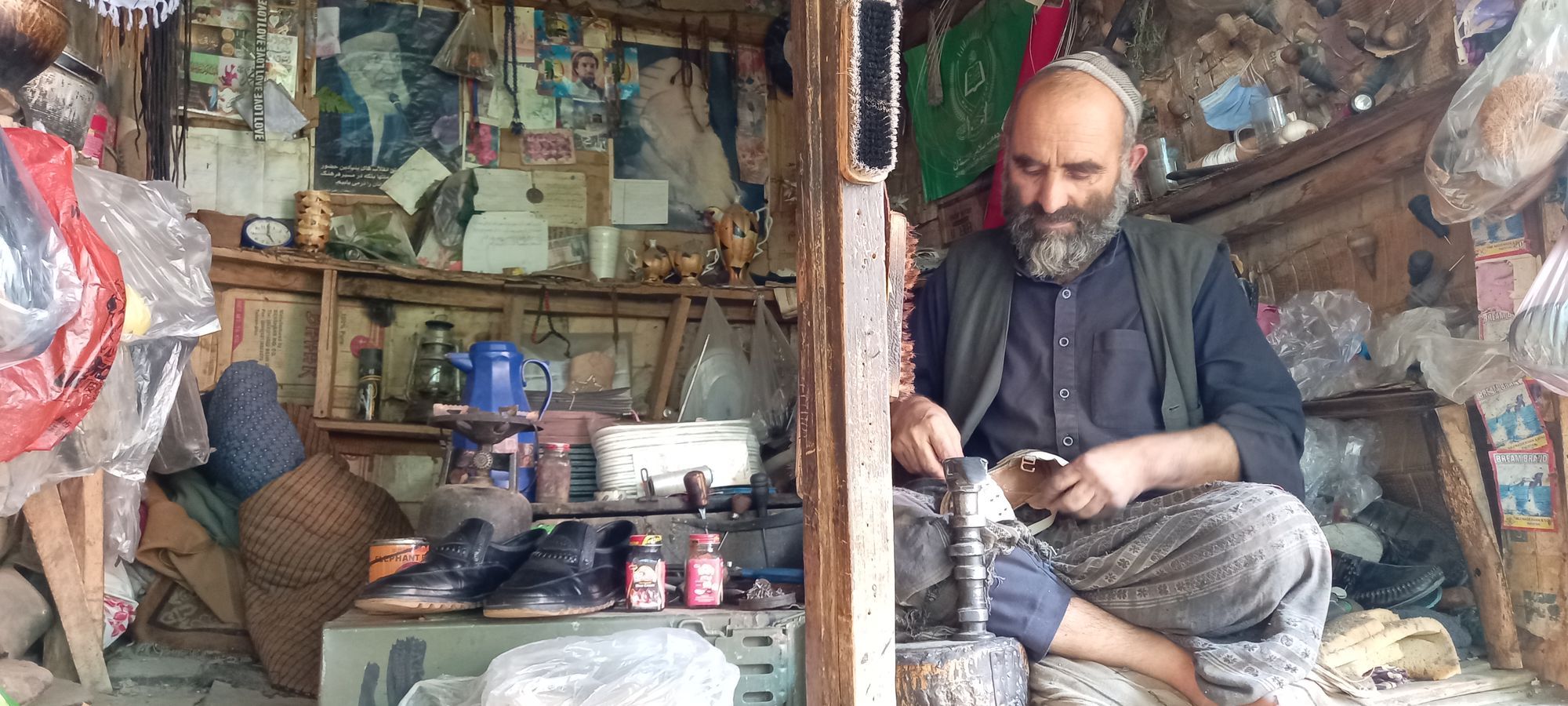
— One Day in Afghanistan —
Reporting by Shabana Farahmand, written by Abdul Ahad Poya, edited by Mohammad J. Alizada, & Brian J. Conley
Alive-in is a not-for-profit media agency that mentors journalists from underrepresented communities to increase local and international understanding. Subscribe to receive our stories directly in your inbox.
If you are able to support our work financially, please click the button below.
FAIZABAD — Shoes have long been considered a basic human need, but due to the continuous war in Afghanistan and resulting poverty, Afghans have time and again struggled to afford the most basic human needs. The existence of shoe cobblers in Afghanistan until now might be for this precise reason, they are there to fix your old shoes, maybe you just tore through one of them and couldn’t afford to buy a new one, so you have the shoe cobbler stitch them back up.
Afghanistan’s economic crisis has left millions of Afghans strapped for cash and unable to afford new shoes. In this situation the work of shoe cobbler, an ancient profession long abandoned in wealthier countries, is vital in Afghanistan. While a new pair of shoes are totally out of reach for cash-strapped Afghans, due to the current economic crisis now many Afghans cannot even afford to pay the small fee for their old shoes to be repaired.
In today’s story of One Day in Afghanistan, Shabana Farahmand visits a shoe cobbler who has spent his life repairing and shining other people’s shoes to earn an income and take care of his family.
It’s around 8:30 am as I arrive at 50 year-old Noorullah Ahmadi’s workplace, a small wooden shack packed with accessories and tools including spools of thread, nails, brushes, pieces of leather and other cobbling equipment. A small number of kitchen supplies including a pressure cooker can also be seen in the shack. The shack sits near the Kokcha River, which originates from the glaciers of Karan and Manjan district and runs through Badakhshan province, including the city of Faizabad, the provincial capital before joining the Amu River in the neighboring Takhar province.
Pictures of Afghan warlords affiliated with the Northern Alliance, including its late leader Ahmad Shah Masood hang from the walls of Noor’s shack.
Noorullah who has been living and working in this small shack for the past 22 years, looks up and greets me while busy repairing a pair of women’s shoes. A canary chirps away inside a red bird cage hanging from the wall close to the wooden shack.
I jokingly say, “Uncle, you seem lively, the bird is like a companion to you!”
He laughs saying, “My child, the bird belongs to a friend of mine who wants me to be a sitter for a few days but I have grown attached to it now.”
Currently single, Noorullah and his wife divorced after 30 years of marriage in March. “My ex-wife Nur-ul Nisa and I desired children very much but never had one so we decided to separate.”
Noorullah is part of a family of nine, his father, two brothers, a sister, sister-in-law, uncle, and one of his brother’s children. His older brother Ainullah is 60, has a son and two daughters, his other brother Din Mohammad is 40 but still single because he is too poor to afford marriage.
His father and brothers are farmers for hire but Noorullah has been the primary source of income for his family since he started working as a shoe cobbler.
“I wish their work would have sustained our lives a little bit,” Noor says, the sadness and load of work throughout his life evident from the tone of his voice.
Noor is originally from Yaftal-e Payin, a district about 50 kilometers (approximately 31 miles) northwest of Faizabad, but he only goes home for a week once every two or three months.
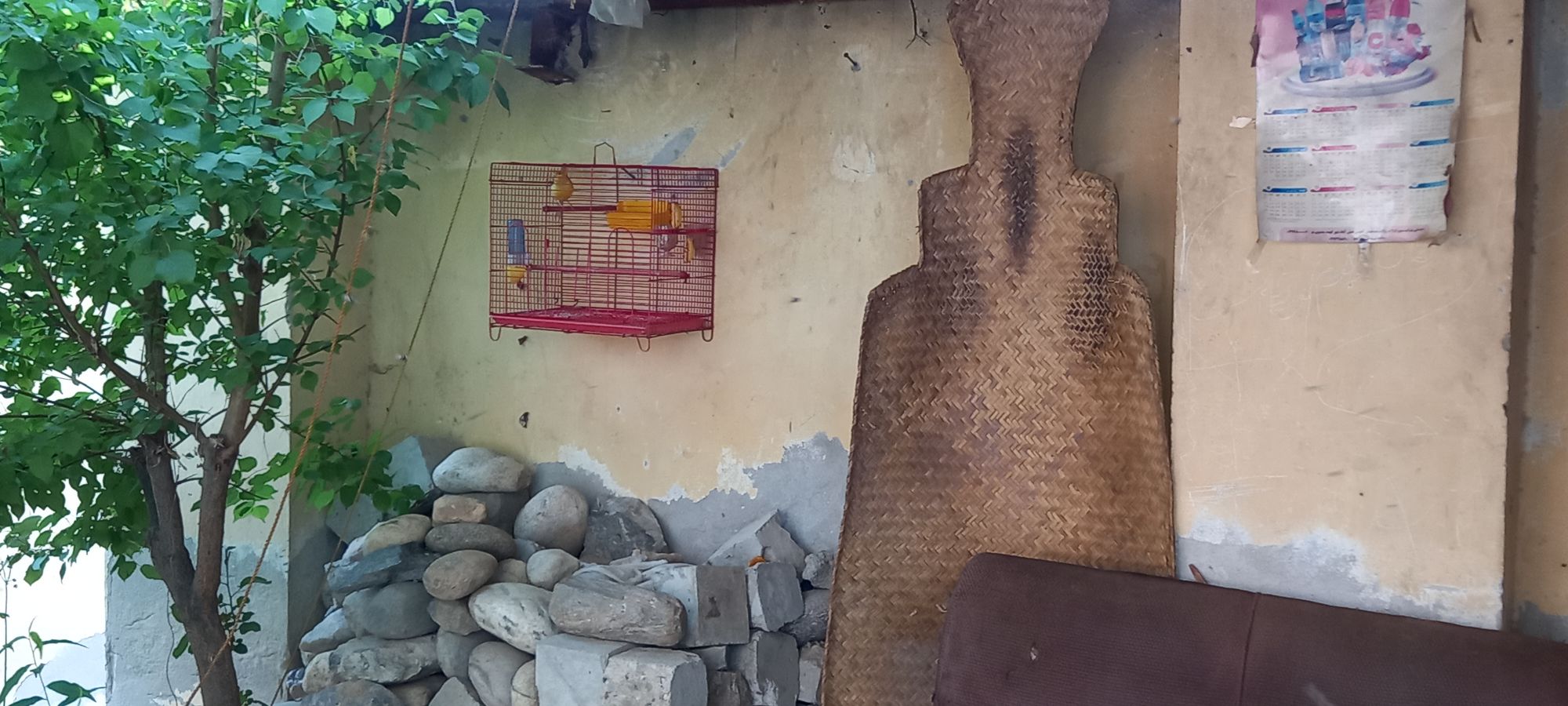
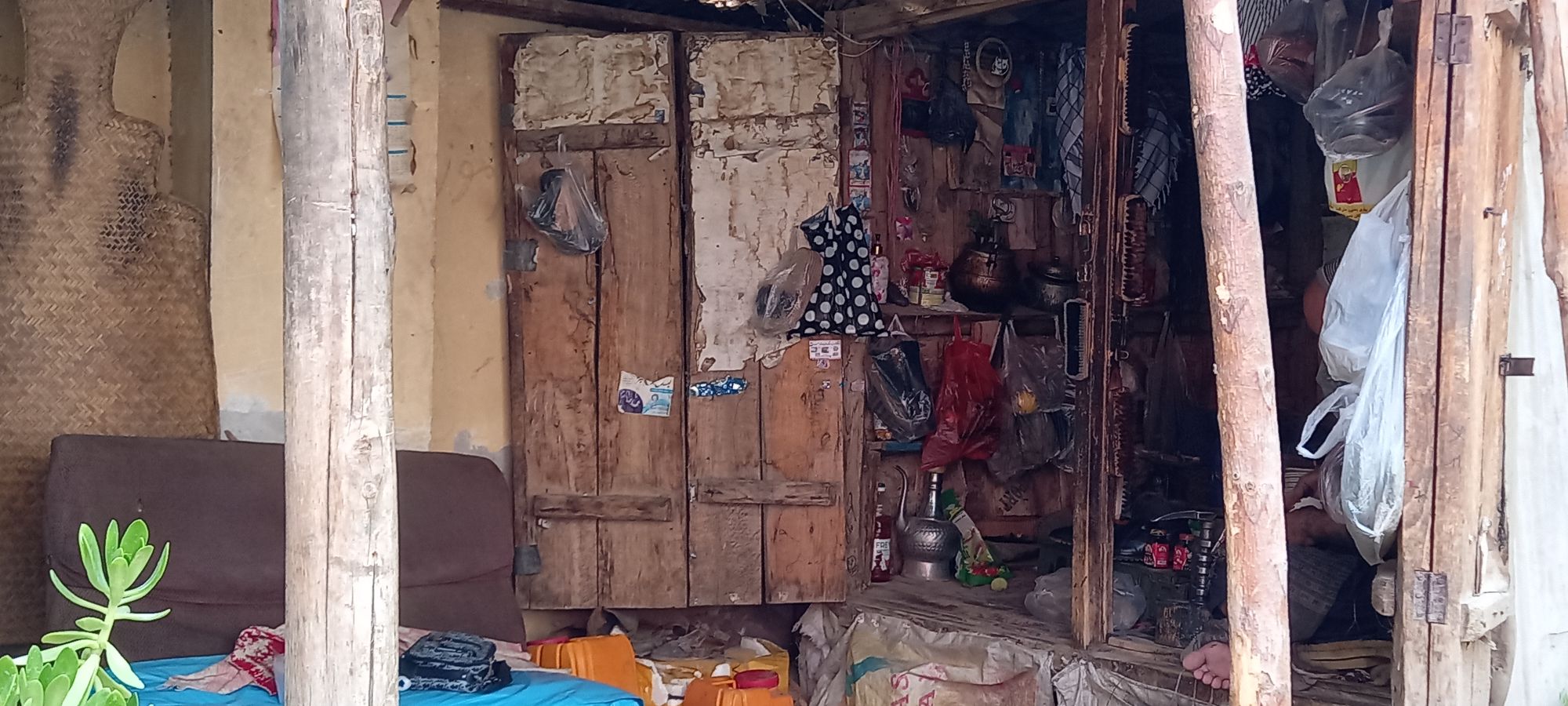
Noor came to Faizabad 28 years ago, he worked for another shoe cobbler in the provincial capital for six years before opening up his own store. According to Noorullah, people in his district, like his family, are deprived of the most basic human needs including electricity and asphalted roads. The road to his district becomes inaccessible during winter and spring seasons due to heavy snow.
But Yaftal-e Payin is not the only district that becomes snowbound in the winter, each year the winter brings heavy rain and snow, cutting off travel between many of Afghanistan's provinces and districts. During the winter, more than half of Afghanistan's provinces are blanketed in snow for weeks at a time.
For more information about Afghanistan’s challenges during the winter months, please read Alive in Afghanistan’s Half of Afghanistan, Snowboud for Winter.
“Over the years I have been working as a shoe cobbler, I have repaired and polished shoes for everyone. I have lived an excruciatingly difficult life and spent my whole time in this shack at the service of the people,” Noor says.
Noorullah has lived and worked though cold winters in the same shack without any heating with his nephew 26 year-old Zulfiqar. They wash their clothes in the nearby Hamam (public shower) and wear them without ironing.
“I brought Zulfiqar here 12 years ago when he was in eighth grade so he could go to school here because I didn’t want him to grow up illiterate like the children of my village and other people like me. I wanted to bring his sisters too, but I don’t have a house here and I didn’t have enough money to rent one,” Noorullah says.
His ambition for education is high. Noor believes education is the only way out in a country consumed by illiteracy. According to the United Nations Educational, Scientific and Cultural Organization (UNESCO) report in March of 2020, although the literacy rate increased from 34.8 percent in 2017 to 43 percent in 2020, over 10 million youth and adults in Afghanistan remain illiterate.
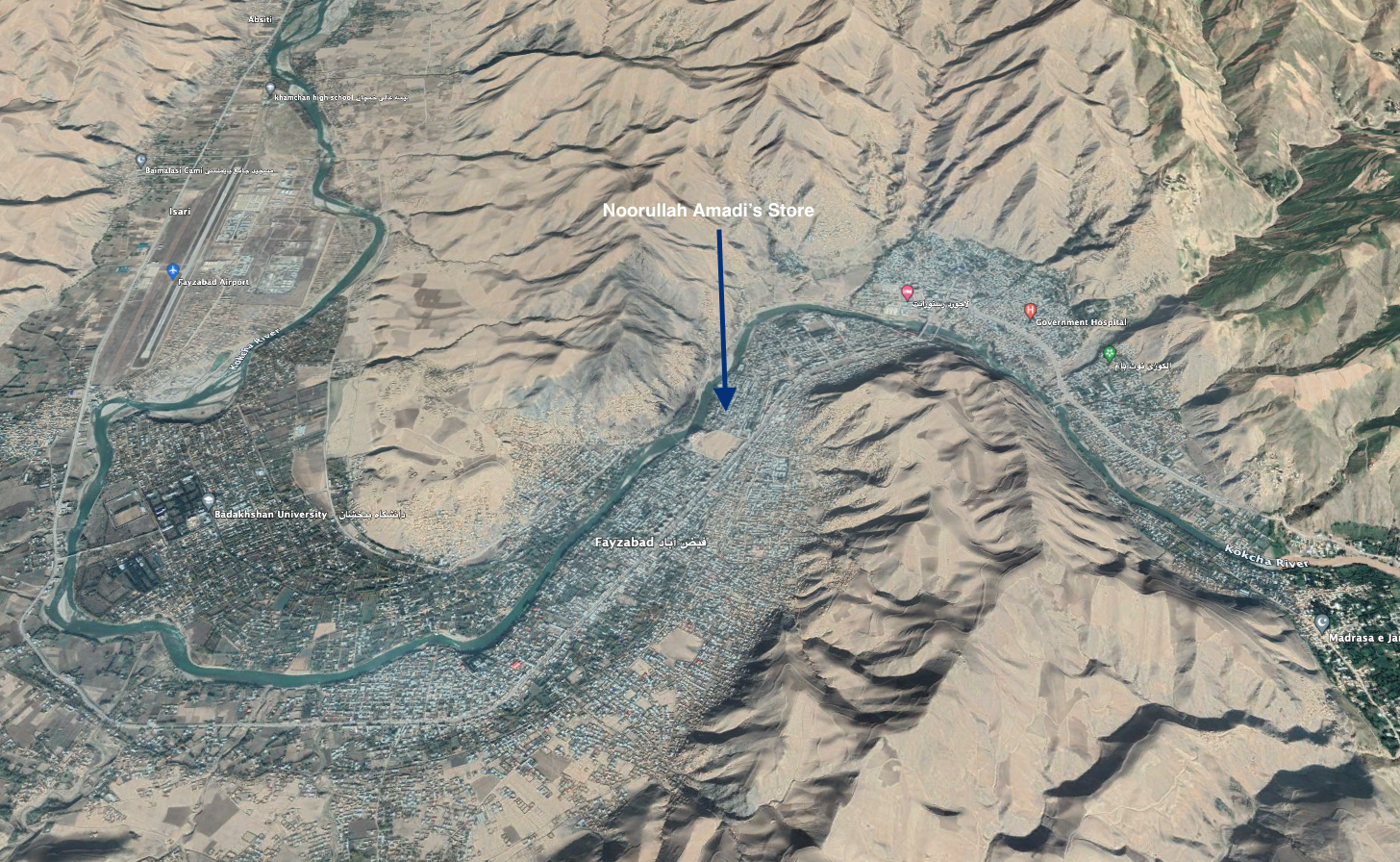
Noorullah helped cover Zulfiqar’s expenses throughout his years of school and university by working hard, Zulfiqar is now a college graduate with two degrees, one in biology through Badakhshan’s public university, and the other in pharmacy through a private university that Noorullah paid for. His dream of educating at least one child in his family came true at last.
“He is my nephew but I love him like a son I never had,” Noorullah says with pride as the clock ticks past 12 and customers keep coming and going. I don’t pay attention to them or their conversation with Noorullah because the story about his life is much more interesting.
Zulfiqar worked for the Badakhshan public hospital’s pharmacy as a volunteer for two years before getting his first paycheck last month. He is now a source of pride for the whole family.
“I cook all meals and wash the dishes myself. Only during the month of Ramadan, our meals are provided by the people,” Noorullah says, adding that he can cook delicious spaghetti and Qabuli Palaw, an Afghan dish made of rice, lamb or beef, and carrots and raisins.
As it is the month of Ramadan there is no preparation for lunch, and dinner is usually brought to him by other people in the neighborhood.
Noorullah invested 10,000 Afghanis (about $200 at the time) when he opened his store two decades ago. His usual work hours are from 7 in the morning until 4 in the afternoon.
“I faced many problems when I started the business because I didn’t know anyone in the neighborhood and no customers would come in, but after some time, that problem was solved as my customer base kept growing by the day,” Noorullah tells Alive in Afghanistan.
“None of my clients go bankrupt by paying me to repair or polish their shoes,” Noorullah says with humor. Noor charges 20 Afghanis ($0.22 currently) for polishing a pair of shoes and 40 Afghanis ($0.45) to repair them.
Customers come and go while we talk, one customer introduces himself as Anwar saying, “Kaka (uncle) Noorullah is very respectful, we love his kind and hardworking personality!”
Anwar who seems to know “Kaka Noorullah” as he calls him, says Noor is famous for his generosity despite his meager income, “He repairs or polishes shoes for free if someone cannot afford to pay him.”
Noorullah believes that kindness and generosity do not require wealth, but a big heart, which is why he doesn’t hesitate from helping those who need it.
Our conversation turns to the current situation, “I used to make between 800 to 900 Afghanis ($8.99 to $10.11) per day, especially near Eid, but after the Taliban came to power, the number of customers have diminished with my income reducing to around 300 Afghanis ($3.37) per day.”
Sanctions against the Taliban following their victory in August of 2021, as well as the freezing of Afghan government assets by western countries, mainly the United States, have fueled a growing humanitarian catastrophe and economic crisis that is getting worse with each passing day. To find out more about Afghanistan’s economic crisis, read Alive in Afghanistan’s articles on economy.
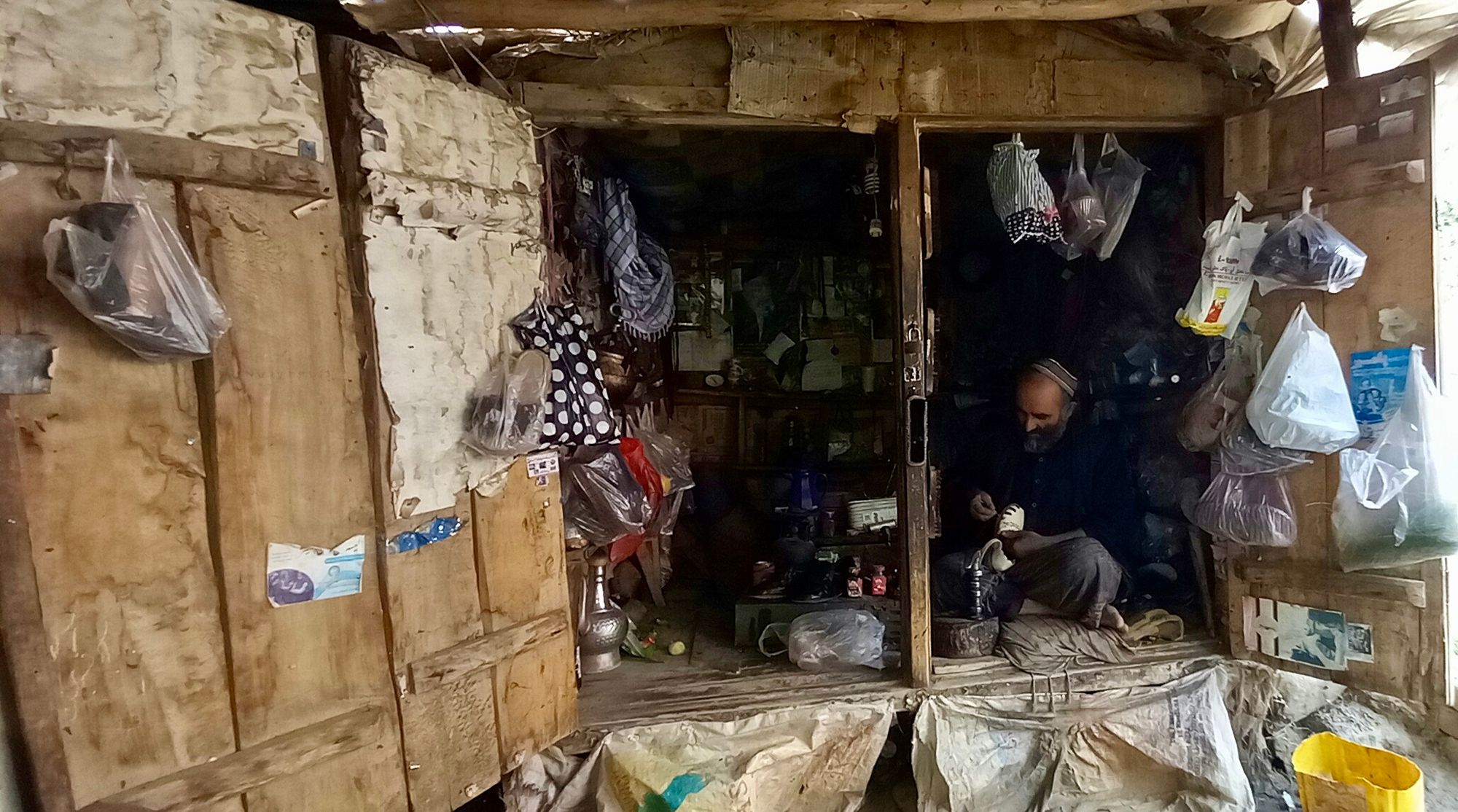
The clock ticks past 2 pm as Noor starts repairing another pair of women’s shoes. Many people greet him as they walk by, asking him how he is doing.
“People love me and my work, some of them walk here just to greet me,” Noorullah says and it shows from the reaction of everyone and their greeting as they pass by his shop.
At we get close to the end of his work day, Noorullah tells me an informative story, “A shoe cobbler’s assistant would wash the leather they used for making shoes every day near a river; the cobbler used to slap his assistant every day before he left to wash the pieces of leather saying – I do this so you are careful and the water does not take the leather away from you! One day a piece of leather was taken away by the flow of water as he was washing it, he said to himself – the cobbler slaps me every day so I can be careful, now I feel sorry for myself!
The fearful helper came to the shoe cobbler and told him everything but the cobbler told him it’s ok. The helper was really surprised and asked, You are not going to slap me?
The cobbler said: No, I slapped you so you would be careful before it was taken away, there is no reason to hit you after!”
What Noorullah, who heard this story on the radio, his window to the world, takes away from this story is, “That’s what life is, do your best before the water takes your piece of leather, once it’s gone, there is no point in regretting it!”
Shoes have long been considered a basic human need, but due to the continuous war in Afghanistan and resulting poverty, Afghans have time and again struggled to afford the most basic human needs. The existence of shoe cobblers in Afghanistan until now might be for this precise reason, they are there to fix your old shoes, maybe you just tore through one of them and couldn’t afford to buy a new one, so you have the shoe cobbler stitch them back up.
Noorullah is part of a family of nine, his father, two brothers, a sister, sister-in-law, uncle, and one of his brother’s children. His older brother Ainullah is 60, has a son and two daughters, his other brother Din Mohammad is 40 but still single because he is too poor to afford marriage.
His father and brothers are farmers for hire but Noorullah has been the primary source of income for his family since he started working as a shoe cobbler.
“I wish their work would have sustained our lives a little bit,” Noorullah tells me, the sadness and load of work throughout his life evident from the tone of his voice.
Noor came to Faizabad 28 years ago, he worked for another shoe cobbler in the provincial capital for six years before opening up his own store. According to Noorullah, people in his district, like his family, are deprived of the most basic human needs including electricity and asphalted roads.
Alive-in is a not-for-profit media agency that mentors journalists from underrepresented communities to increase local and international understanding. Subscribe to receive our stories directly in your inbox.
If you are able to support our work financially, please click the button below.
